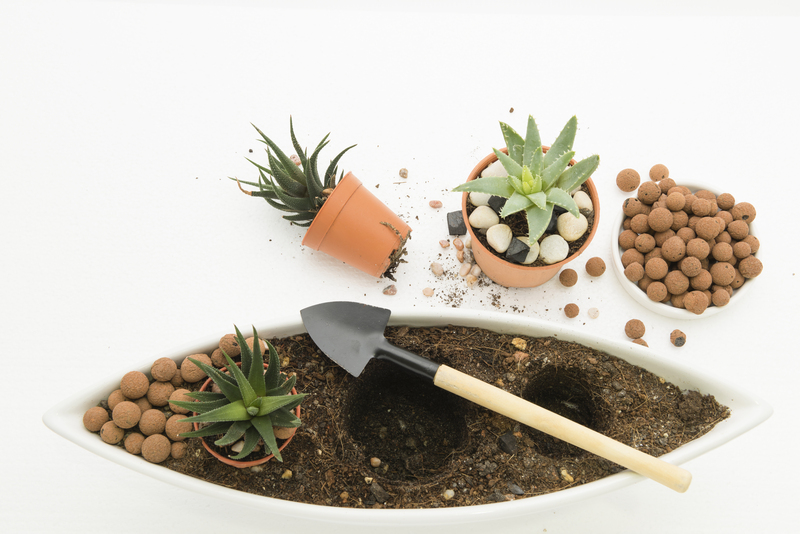Organic Waste's Role in Soil Rejuvenation
Posted on 17/08/2025
Understanding the Power of Organic Waste in Soil Rejuvenation
Soil is the foundation of life on Earth. As modern agriculture continues to push land productivity to its limits, soil degradation becomes a greater threat to food security, environmental balance, and sustainability. One of the most effective, time-honored methods of restoring depleted soils is through the incorporation of organic waste. In this comprehensive article, we will explore how organic matter from waste materials is essential for soil restoration, the science behind it, and actionable strategies for making the most out of our organic refuse.

What is Organic Waste?
Organic waste describes any material that originates from living organisms and is biodegradable. This can range from kitchen scraps and yard trimmings to agricultural by-products and livestock manure. Instead of sending this valuable resource to landfill, recycling it through the soil offers remarkable ecological and agricultural benefits.
- Food waste - including fruit and vegetable peels, coffee grounds, eggshells, etc.
- Garden and yard clippings - such as grass, leaves, twigs, and prunings.
- Animal manure - cow, chicken, horse and other livestock droppings (properly composted).
- Agricultural byproducts - such as straw, husks, and other plant residues.
Not only does managing organic waste responsibly reduce the amount of garbage entering landfills, but it directly helps restore soil fertility and health.
The Science Behind Soil Rejuvenation with Organic Waste
Nutrient Cycling and Soil Fertility
The most powerful benefit of using organic residues for soil rejuvenation lies in their ability to cycle nutrients. When organic matter decomposes, it releases important nutrients like nitrogen (N), phosphorus (P), and potassium (K)--the same macronutrients that synthetic fertilizers provide. However, these nutrients are released more slowly, improving soil fertility over time and reducing nutrient leaching.
- Slow-release nutrition: Microorganisms steadily break down organic matter, ensuring plant roots have ongoing access to vital nutrients.
- Enhanced soil biodiversity: Organic amendments foster a thriving web of soil bacteria, fungi, earthworms, and more, all of which further enhance soil structure and plant health.
- Soil structure and water retention: Humus, the end product of decomposed waste, binds soil particles together, increasing aeration and water holding capacity.
The Role of Microorganisms in Decomposition and Soil Health
When organic waste is added to the soil, it becomes fuel for beneficial microbes. Bacteria, fungi, and invertebrates actively participate in breaking down complex organic molecules (such as cellulose and lignin) into simpler compounds. This microbial activity promotes healthy soils by:
- Suppressing plant diseases through natural competition
- Making nutrients more available for plant uptake
- Improving soil's natural structure and aggregation
- Enhancing soil resilience against erosion and drought
The richer the soil biodiversity, the better its ability to withstand environmental stresses--a crucial factor in the face of global climate change.
Key Benefits of Organic Waste Utilization in Soil Restoration
1. Enhancing Soil Organic Carbon
Soil organic carbon, mainly composed of decomposed organic matter, is a vital indicator of soil health. Introducing fresh organic wastes helps replenish carbon stocks lost through years of intensive farming and erosion.
- Boosts soil fertility by acting as a reservoir for vital plant nutrients
- Supports a living soil ecosystem by serving as food for beneficial microorganisms
- Improves soil texture, porosity, and water infiltration rates
2. Reducing Soil Erosion and Degradation
One of the often-overlooked roles of organic amendments is their ability to bind soil particles. The humus created from composted waste acts like glue, reducing the risk of wind and water erosion. As a result, topsoil--the most nutrient-rich layer--remains intact, further promoting healthy plant growth.
3. Decreasing Reliance on Chemical Fertilizers
Continuous use of synthetic fertilizers can lead to soil acidification, nutrient imbalance, and even groundwater contamination. By recycling biodegradable waste into the soil, we minimize the need for artificial soil amendments while restoring the innate fertility of the land.
4. Mitigating Greenhouse Gas Emissions
When organic waste rots in landfills, it produces methane--a potent greenhouse gas. Composting and returning this material to the soil instead sequesters carbon and reduces methane emissions, contributing to both soil health and climate change mitigation.
Types of Organic Waste for Soil Improvement
Not all organic materials are created equal. Here are some of the most common--and most effective--sources for organic soil rejuvenation:
Compost
Compost is the result of controlled aerobic decomposition of organic matter. Rich in nutrients and beneficial microbes, it is one of the best and safest materials for reinvigorating depleted soils.
Green Manure
Green manure involves growing specific cover crops (like legumes or rye) and plowing them into the soil before they mature, thus adding fresh organic residue and nutrients back to the earth.
Agricultural Residues
Straw, stubble, and husks left after harvest provide an excellent carbon source when incorporated and decomposed in the soil. They can also act as mulch, reducing evaporation and protecting soil surfaces.
Livestock Manure
Animal manure (properly composted to kill pathogens) is a traditional fertilizer that supplies both organic matter and a steady release of nutrients.
Vermicompost
Vermicompost is created by earthworms digesting organic waste, which results in a potent, microbe-rich soil amendment.
How to Use Organic Waste Effectively for Soil Rejuvenation
Harnessing the benefits of organic waste for soil regeneration takes thoughtful management. Here are practical steps to maximize its impact:
- Composting: Decompose food scraps, yard waste, and manure in aerobic conditions to eliminate odors, destroy pathogens, and produce high-quality organic matter.
- Mulching: Apply shredded leaves, grass clippings, or straw on the soil surface to conserve moisture, suppress weeds, and slowly release nutrients as they break down.
- Direct incorporation: In smaller quantities, raw organic material can be buried directly into the soil but must be managed to prevent nitrogen tie-up or pest issues.
- Crop rotation and green manures: Integrate green manure crops within crop cycles to ensure continuous organic matter addition and nutrient cycling.
Best Practices for Organic Waste Application
- Always compost manure and food waste before field application to kill weed seeds and diseases.
- Apply organic amendments during the off-season or before planting, allowing sufficient decomposition time.
- Avoid over-application, which can lead to nutrient runoff or imbalances.
- Test soil regularly to monitor changes in organic matter, nutrient status, and pH.
Potential Challenges and Considerations
While using organic materials to restore soil has countless benefits, there are challenges:
- Raw waste may attract pests or harbor pathogens if improperly managed.
- Some organic wastes (like meat or dairy) are less suitable due to their slow decomposition and risk of odor.
- Large-scale transport and processing of organic residues require resources and logistics.
- Compost quality varies--regular testing and careful sourcing are key.

The Global Impact of Organic Waste Recycling on Soil Regeneration
Returning organic matter to the soil is not only essential on a farm or home garden level but also has significant global implications:
- Reduces landfill burden and greenhouse gas emissions
- Improves agricultural productivity and food security
- Promotes sustainable land management and rural livelihoods
- Helps restore ecosystems, fight desertification, and preserve biodiversity
Case Studies
In countries like India, systematic composting of municipal and agricultural waste has reversed decades of soil degradation and significantly increased crop yields. In Europe and North America, regenerative agriculture practices incorporating organic soil amendments are gaining traction, demonstrating that waste is, in fact, a resource.
Conclusion: Organic Waste--Nature's Solution for Soil Revival
Soil rejuvenation is more critical than ever in our rapidly changing world. By recognizing organic waste's vital role in restoring soil fertility, we close a natural loop: returning to the earth what was once taken from it. This regenerative approach not only builds resilient agricultural systems but also protects our environment for generations to come.
Embracing organic matter recycling--be it through composting, mulching, green manures, or responsible livestock management--offers a sustainable pathway toward healthier soils, reduced pollution, and enhanced food security. Whether you are a home gardener or managing hectares of farmland, reintegrating organic waste into the soil is both an ancient wisdom and a modern necessity.
```Latest Posts
Necessities for the Cutting-Edge Gardener
Blossom in the garden with these 9 essential insights
Building a Safe Outdoor Adventure Zone for Kids

